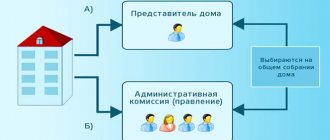Pros and cons of subsidiary management companies
Cons:
All financial flows for house maintenance pass through an affiliated company and are controlled by the developer
Through a “pocket” management organization, it is easier for the developer to ignore complaints about the quality of the house while it is under warranty.
The administration of such a management company favors the parent company, and is a priori not on the side of the residents in resolving current issues of house maintenance.
Affiliated management companies often inflate the cost of utilities. On average, the work of a management company from a developer turns out to be more expensive due to the provision of additional services.
The management company disposes of the general territory of the residential complex at its own discretion. Until the creation of the HOA, attics, roofs, basements, and facades of the building are under the control of the management company. Utility companies can rent out these premises to third parties (cellular operators or Internet providers), despite the dissatisfaction of residents.
The principle of operation is “After us there may be a flood!” This happens when “utility workers” work without the control of the developer and residents. At the end of the warranty period, the management company from the developer may be taken out of operation of the house. The latter remains “ownerless” with many deficiencies.
In accordance with the law, the developer is obliged to transfer the house to the “utility workers” three months after putting the facility into operation, but the new building may not have time to be occupied during this period, especially during a crisis.
Until the new house is at least half occupied (50%), residents do not have the right to organize a Home Owners Association (HOA) and independently choose a utility service.
Pros:
The “subsidiary” management company will begin to provide the full range of utilities and operational services simultaneously with the issuance of keys to the apartment.
The level of competence in complex engineering equipment is higher than that of an organization “from the street”.
It is in the interests of the developer to additionally control the quality of work of his management company on an equal basis with the residents, because he is interested in maintaining the positive image of the project and brand.
The developer may have positive experience in housing management, while the HOA meeting may choose an unqualified management company, focusing, for example, only on the low cost of maintaining the house.
Throughout the entire warranty period, the “own” management company serves as an additional link between the developer and residents and is under double control.
Let us pay attention to the last two criteria: an independent management company is a priori not responsible for the developer’s shortcomings, the case will most likely be sent to court, and the proceedings may drag on for months and even years. An affiliated company has no right to do this, and construction flaws will have to be corrected in any case. Note that under the contract the developer is obliged to correct the identified construction defects within a 5-year warranty period.
TERMINATION OF HOA HOUSE MANAGEMENT
“Housing and communal services: accounting and taxation”, 2011, N 1
TERMINATION OF HOA HOUSE MANAGEMENT
According to the Housing Code, owners of premises in an apartment building can change the way the house is managed at any time. Of course, without this norm, housing self-government would be impossible. But at the same time, it is precisely thanks to this provision of the law that the so-called leapfrog of management organizations very often arises, when the HOA changes the management company, and after some time the owners again turn to it for services, and vice versa. Let’s try to figure out what the consequences of such a “leapfrog” are in this article.
Despite the fact that an HOA, in our opinion, is the most effective form of home management, it should be recognized that its full implementation requires great responsibility on the part of homeowners: it is not enough to simply register an HOA, it is important to create conditions for its functioning, and the latter is sometimes impossible due to various reasons.
In this regard, let’s imagine a situation where the owners of the premises in the house chose the HOA as a method of management, created a partnership and registered it as a legal entity. Work in the HOA did not work out, as a result of which after some time the owners changed the management method to a management organization and entered into an agreement with the company. What to do with the partnership in this case? What is its status?
HOA is a legal entity and a way to manage a house
It is important to understand that the HOA is considered in the legislation from two positions: as a method of management, alternative and incompatible with the method of management through a management organization, and as a legal entity that, within the framework of contractual relations, may well coexist with the management company.
This is interesting: Reserving a Sberbank account for government defense orders
Thus, the procedure for creating an HOA and choosing a method of managing an apartment building is regulated by the Housing Code of the Russian Federation, and the procedure for state registration of an HOA as a legal entity upon its creation and liquidation is regulated by the Civil Code of the Russian Federation and the Federal Law of 08.08.2001 N 129-FZ “On State Registration of Legal Entities and individual entrepreneurs" (hereinafter referred to as the Registration Law). Neither the Civil Code of the Russian Federation nor the specified Federal Law provide for any special conditions for registering the creation and liquidation of HOAs; therefore, both are carried out in accordance with the general procedure, which we will consider below.
According to paragraph 8 of Art. 63 of the Civil Code of the Russian Federation, a legal entity is considered to have ceased to exist after making a corresponding entry in the Unified State Register of Legal Entities (hereinafter referred to as the Unified State Register of Legal Entities). In this regard, it is a mistake to assume that when the method of managing an apartment building is changed and a management company is selected, the HOA automatically ceases to exist.
Here it is appropriate to refer to Art. 161 of the Housing Code of the Russian Federation, according to which the owners of premises in an apartment building are required to choose one of the methods of managing the house (clause 2), and an apartment building can be managed by only one management organization (clause 9). It would seem that the norms of the laws conflict, but in fact there is no such contradiction. Once again turning to the services of a management company, homeowners at a general meeting decide on changing the method of managing an apartment building to management through a management organization, that is, the management method remains the only one. In this case, the HOA is obliged to cease its work, and an agreement is concluded with the management company, thereby the actual actions for managing the common property in the house are carried out not by the HOA, but by the newly selected organization.
Thus, the HOA continues to exist even if there is no need for it until it is liquidated.
On the need to liquidate the HOA
Sometimes the owners of premises in an apartment building leave the created HOA (consciously or not) due to a number of reasons.
Firstly, so to speak, “in reserve.” The process of creating a partnership is very labor-intensive, and one can feel sorry for the work done. In addition, if the work of the management company is unsatisfactory, it is much easier to resume the work of the HOA than to create it again.
Secondly, the procedure for liquidating a legal entity is a rather complicated undertaking, and if you lose interest in the partnership, there will be no one to do it.
Thirdly, the owners of premises in the house may not think about the need to liquidate the HOA.
In our opinion, it is important for the owners of premises in the house to decide the fate of the HOA even when changing the management method, assessing the pros and cons of liquidating the partnership. This is important, since a good desire to leave the HOA “as a safety net” without complying with the norms of the current legislation and some legally significant actions can lead to unpleasant consequences for citizens (including financial ones). To determine the range of possible problems, let us turn to the grounds for liquidating the HOA.
Grounds for liquidation of an HOA
From a legal point of view, there are a number of grounds under which an HOA can and must be liquidated. Let us make a reservation that the issue of HOA bankruptcy is not the subject of consideration in this article.
Thus, the Housing Code obliges the owners of premises at their general meeting to make a decision on the liquidation of the HOA if the members of the partnership have no more than 50% of the votes of the total number of votes of the owners of premises in an apartment building (Clause 2 of Article 141 of the Housing Code of the Russian Federation). However, as often happens, there is an obligation, but there is no sanction for its failure. Therefore, it turns out that often the HOA is liquidated on this basis only if one of the interested parties (the management company or one of the citizens) applies to the court with a claim for forced liquidation.
But a situation may arise that the HOA, while remaining inactive, has a sufficient number of members. In this case, the solution to the issue of voluntary liquidation, in accordance with paragraphs. 2 p. 2 art. 145 of the Housing Code of the Russian Federation, remains with the general meeting of HOA members . That is, it is not at all necessary for all owners to first leave the partnership and only then decide on its liquidation.
Under certain conditions, another basis for the liquidation of an HOA may be a court decision made at the request of the authorized body on the liquidation of a legal entity in accordance with clause 2 of Art. 61 of the Civil Code of the Russian Federation, namely in the case of gross violations of the law during its creation, if they are of an irreparable nature, as well as in the case of carrying out activities without proper permission (license), or prohibited by law, or in violation of the Constitution of the Russian Federation, or with other repeated or gross violations of the law (other legal acts) and the systematic implementation by a non-profit organization of activities that contradict its statutory goals.
In our case, the HOA can be liquidated by the court, for example, at the request of the tax authority due to gross violations of tax legislation. Such gross violations may include failure to fulfill the obligations provided for in Art. 23 of the Tax Code of the Russian Federation, in particular, on paying taxes, keeping records of income, expenses and objects of taxation, submitting tax returns, submitting to the tax authorities information and documents necessary for the calculation and payment of taxes (Resolution of the Presidium of the Supreme Arbitration Court of the Russian Federation dated 06/05/2001 N 7745/00) . Thus, accounting for an HOA, if you want to preserve it as a legal entity, must be maintained even in the absence of any activity.
There are no other grounds for liquidating the HOA.
Financial and contractual obligations of the HOA
when changing the control method
By ceasing its activities but continuing to exist, the HOA must minimize its contractual and financial obligations. This means that you must pay for all work and terminate all contracts with third parties. As for the fate of the funds collected from the owners of the premises in the house and remaining after the repayment of all obligations, it can be determined differently.
In fact, when changing the management organization, these funds will be unjust enrichment of the partnership in accordance with Chapter. 60 Civil Code of the Russian Federation. In our opinion, the most indisputable option seems to be the return of funds to the owners of the premises in the house, but technically this is quite difficult to do. In addition, these funds may include money for major repairs of common property in an apartment building, which would be absolutely inappropriate to transfer to the owners. These funds must be transferred to the newly selected management company based on the decision of the general meeting of owners of premises in an apartment building (see Resolution of the Federal Antimonopoly Service No. F03-811/2009 of March 17, 2009). Let us remind you that issues of major repairs fall within the competence of the general meeting of owners of premises in the house in accordance with paragraphs. 1 item 2 art. 44, paragraph 2, art. 158 Housing Code of the Russian Federation. In any case, we recommend including the issue of transferring funds accumulated for major repairs on the agenda of the general meeting on changing the management method.
This is interesting: Article 137 of the Labor Code
It is clear that the option of transferring funds from the HOA to the management company seems to be the most convenient for the owners. However, it should be taken into account that the HOA provides services only to its members on a non-contractual basis. Accordingly, the latter have the right to decide the fate of their funds at a general meeting of HOA members, and for those who are not members, the issue can be resolved individually by unilaterally terminating the contract in accordance with Art. 717 of the Civil Code of the Russian Federation at the initiative of the owner.
The question arises: can the HOA unilaterally terminate the contract with the homeowner if such a right is not provided for in the contract? The problem is somewhat theoretical, but still relevant, since citizens rarely think about such issues. Meanwhile, there are only general rules of civil law that regulate this situation without taking into account the specifics of the contract for the maintenance and repair of residential premises. So, paragraph 2 of Art. 719 and paragraph 2 of Art. 328 of the Civil Code of the Russian Federation grants the right to the contractor (in our case, the HOA) to refuse to fulfill the contract if the customer fails to fulfill counter-obligations. When the management organization changes, the home owner (customer) will stop paying for the services and work of the HOA under the contract, which may become grounds for termination of such a contract.
Liquidation of an HOA on a voluntary basis
The decision on liquidation, as stated above, is made at a general meeting of HOA members with at least 2/3 of the votes of the total number of votes of HOA members (clause 2, clause 2, article 145, clause 4, article 146 of the Housing Code of the Russian Federation). The decision must indicate the composition of the liquidation commission of the HOA (as a rule, it coincides with the composition of the board of the partnership). According to paragraph 3 of Art. 62 of the Civil Code of the Russian Federation, from the moment the liquidation commission is appointed, the powers to manage the affairs of the legal entity are transferred to it. The liquidation commission acts in court on behalf of the liquidated legal entity.
In accordance with paragraph 1 of Art. 20 of the Law on Registration, within three days from the date of making the decision to liquidate the HOA, a notification should be submitted to the tax authority at the location of the partnership in the form P15001, approved by Decree of the Government of the Russian Federation of June 19, 2002 N 439. Based on this notification, an entry is made in the Unified State Register of Legal Entities on acceptance in relation to a legal entity, decisions on liquidation are issued (sent by mail) a certificate of entry into the Unified State Register of Legal Entities and an extract from the Unified State Register of Legal Entities, which indicates that the legal entity is in the process of liquidation.
In order to identify creditors, the liquidation commission publishes information about the decision made in the journal “Bulletin of State Registration”. According to Art. 63 of the Civil Code of the Russian Federation, creditors have the right to present their claims within two months from the date of publication of the notice of liquidation of a legal entity.
At the end of the period allotted for the presentation of claims by creditors, the liquidation commission draws up an interim liquidation balance sheet, which is approved at the general meeting of the HOA members. Together with a notification about the preparation of an interim liquidation balance sheet of a legal entity in form P15003, it is sent to the tax authority (a certificate is also issued).
Based on this balance, tax authorities carry out control measures (inspections) (see clause 11 of article 89 of the Tax Code of the Russian Federation).
After two months from the date of publication of the publication on the liquidation of the HOA, the liquidation commission may contact the tax office to make a record of the liquidation of the legal entity with the following documents:
— an application for state registration signed by the applicant in form P16001;
- a document confirming payment of the state duty in the amount of 4,000 rubles.
In accordance with these documents, an entry is made in the Unified State Register of Legal Entities and a certificate of state registration of the liquidation of the HOA is issued.
Thus, the procedure for liquidating an HOA may seem complicated and time-consuming, but it should be remembered that it is aimed at protecting the interests of creditors, which, by the way, are also homeowners. In addition, in our opinion, when creating a partnership, you always need to think about the responsibility that the neighboring community assumes, and consider the difficult procedure for relieving yourself of such responsibility as a motivation for comprehensive consideration.
So, we have found out that the rejection of this method of managing an apartment building, such as an HOA, does not mean the absolute need to liquidate the partnership as a legal entity. However, it is advisable to consider this issue (preserve or liquidate the HOA) at a general meeting simultaneously with the choice of a new method of managing the house. If the HOA is not liquidated, when changing the management method, it is necessary to make settlements with all counterparties and terminate business contracts (it is especially important to terminate resource supply contracts). However, the partnership still has responsibilities for maintaining accounting records, submitting financial statements and tax reporting. The liquidation of an HOA on a voluntary basis is carried out in accordance with the general procedure.
Who has the right to change the management company?
As soon as the new building is at least 50% occupied, residents have the right to organize a meeting of owners and abandon the existing management company, or renew the contract with it on new terms.
Vitaly Bovt
Market expert
“At the same time, it is important to note that until the registration of the transfer of ownership in accordance with the requirements of the Civil Code of the Russian Federation and the Law of July 13, 2015 No. 218-FZ, from the developer to the citizen, the latter, not being the owner of the premises in an apartment building, cannot dispose of his vote in as part of the procedure for selecting a management company,” comments Vitaly Bovt (Alliance of Lawyers). Representatives of the municipality must participate in the meeting and vote for housing tenants (tenants of premises).
For a comfortable stay and prompt resolution of issues related to public services at home, you should choose an initiative group that will defend the rights of its residents - the Council of an Apartment Building (MCD).
The number of members of the MKD Council is established at a general meeting of premises owners, taking into account the number of entrances, floors, apartments available in a given building (Part 4 of Article 161.1 of the RF Housing Code), unless otherwise previously established by a decision of the general meeting of premises owners. The initiator (initiative group) must ensure the holding of the general meeting: formulate an agenda, including issues on the election of the MKD Council and its chairman, draw up a list of candidates, determine the date, place and form of the general meeting. After the owners are informed in advance (10 days) about the event, the initiative group must hold a meeting, sum up the voting results and notify the owners of the decision made.
Communal revolution: how to change the management company to the HOA?
LIVING figured out how to competently change the management company or choose a new way of managing an apartment building.
Housing and communal services are a “sore” topic for many Russians. According to VTsIOM, 8% of citizens consider housing and communal services problems to be one of the main problems of Russia. City residents suffer from high prices for utilities and poor quality work of management companies. Overcoming unscrupulous utility companies can be difficult. LIVING figured out how to competently change the management company or choose a new way to manage an apartment building.
What methods exist for managing an apartment building?
There are three types of apartment building management:
1. Direct control.
2. Management of a homeowners' association or housing construction cooperative.
3. Management of an apartment building by a management organization
What is the difference between each of these methods?
Direct control is possible only in small buildings - no more than 30 apartments. There are few such houses in large cities, so most Moscow and St. Petersburg high-rise buildings are maintained by management companies and homeowners associations.
In a house managed by an HOA, the chairman of the board is fully responsible for all activities carried out in the house: repairs, landscaping and other work. A homeowners association or housing cooperative can enter into an agreement with a management company without changing the form of house management. Then responsibility for the quality of service falls on the hired company.
This is interesting: Intercom fees in 2020
If the house is under the management of a management company, then it independently sets the cost of its work, resolves issues with employee salaries, and can work with any number of residential buildings.
Can one house serve several management companies at once? And does it happen that several control methods operate in one house at once?
In accordance with Part 2 of Art. 161 of the Housing Code of the Russian Federation, owners are required to choose only one of the methods of managing an apartment building. And only one organization can directly manage the house.
However, supervisory authorities regularly record violations of established standards. For example, in December 2020, the Housing Inspectorate discovered 96 apartment buildings in St. Petersburg, divided into front doors, managed by various organizations.
“The simultaneous management of one apartment building by several organizations gives rise to problems such as: improper maintenance of common property; different ways of forming a capital repair fund on one house and, as a consequence, different deadlines for the same types of work; violations of the rights of citizens to own, use and dispose of common shared property,” the Housing Inspectorate warns.
What method of home management is most often chosen?
In St. Petersburg, the palm belongs to management companies: the vast majority of houses are under their management.
According to the Housing Committee, there are more than 22 thousand apartment buildings in the city, of which 4.5 thousand have created HOAs, the remaining 19 thousand houses are serviced by management companies. Of these, 16.5 thousand serve management companies with the participation of city capital, the rest are private companies.
“This balance of power has existed for many years, and rarely does anyone undertake to change the way they manage their home. Most often, residents of new houses in which a management company has already been appointed try to change the management company or create their own HOA,” says Tamara Panchenko, press secretary of the Housing Committee.
When should you think about changing the management company or the way you manage your house?
There are objective indicators that the management company is not coping with its responsibilities. “A change of management company is justified when the company fails to provide high-quality utility services. If you have a large payment, and the management company does nothing, for example, does not clean the staircases, does not carry out routine repairs, and there is no information on financial and economic activities on the website,” explains Tamara Panchenko.
It makes sense to transfer the management of the house into the hands of the HOA if the house has a strong business manager: a person who is ready to take care of the comfort of the residents.
How to change the management company or switch to another management system?
The Housing Committee explains: first, it is necessary to hold a general meeting at which to consider the issue of changing the management company or the method of managing the house. The owners must draw up minutes of the general meeting, choose a new organization (or a new management method) and approve the terms of the agreement (terms, price for services, composition of common property). After this, the rejected management company is obliged to transfer technical documentation for the house to the new service organization.
“At this stage, difficulties arise most often. If the Criminal Code does not want to give in to legal requirements and is playing for time, then you need to contact the housing inspectorate, which deals with such cases,” explains Tamara Panchenko.
Refusal to hand over technical documentation to the home is considered a gross violation. On this basis, the housing inspectorate can seize the house from the management company without a court decision.
From what moment can an apartment buyer take part in a meeting of homeowners?
Previously, only those who had already registered ownership of the apartment had the right to participate in meetings. Starting this year, those shareholders who have just received housing under deeds from the developer, but have not yet managed to register their ownership, will be able to vote for a change in the management company.
Who can initiate a residents' meeting?
Any owner can initiate a meeting. By law, management companies, homeowners' associations and housing cooperatives are required to provide him with a register of homeowners, without which the meeting will not have legal force.
“It should be noted that the register of homeowners is a mandatory appendix to the minutes of the general meeting. Without it, the minutes of the meeting will be considered completed with violations. And this could lead to the cancellation of decisions made at the meeting,” explains legal lawyer Anastasia Zhukova.
It is incredibly difficult to gather all the residents, how is this issue resolved?
Indeed, it is almost impossible to gather all the owners in one room at the same time. Meanwhile, to change the Criminal Code it is necessary to gain more than 50% of the votes. Therefore, voting on important polls is usually carried out in absentia, and those residents who were unable to attend the meeting vote at another convenient time.
It is expected that during the spring session the State Duma will consider a bill that would allow residents to hold meetings in the form of conferences, so that they can participate in the meeting not in person, but delegate a representative of the entrance to it.








